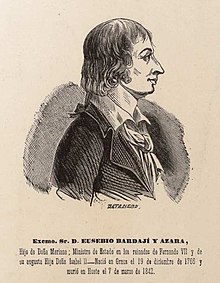Eusebio Bardají Azara
Eusebio Bardají y Azara (born December 19, 1776 in Graus , † March 7, 1842 in Huete ) was a Spanish legal scholar , diplomat , politician and Prime Minister of Spain ( Presidente de Gobierno ) .
biography
Studies and diplomatic career
After attending school, he studied law at the University of Zaragoza and at the Spanish School of San Clemente ( Colegio Español de "San Clemente" ) of the University of Bologna . After completing his studies, he initially stayed in Bologna as a diplomat . In 1800 he became secretary of the embassy in Vienna .
He then became secretary of his uncle, the then ambassador to Paris , where he was an active supporter of Pope Pius VII , who was imprisoned in Fontainebleau after the church dispute with Napoléon Bonaparte . Cardinal Francisco Antonio de Lorenzana recognized him for his courageous performance . During the final years of King Charles IV's reign he returned to Vienna as Plenipotentiary Envoy until 1808 .
After the outbreak of the Spanish War of Independence returned to Spain, where he then 1809-1810 First Secretary stands Assembly ( Cortes ) of Cádiz was. From March 20, 1810 to February 6, 1812 he was First Secretary of State ( Primera Secretarío de Estado ), whose area of responsibility corresponded in principle to that of a Prime Minister, rather he was an Extraordinary Negotiator to Saint Petersburg .
After King Ferdinand VII was able to return to the Spanish royal throne in 1813 after the resignation of Joseph Bonaparte , he was called back to the diplomatic service , where he worked at the embassies in Lucca , London and Paris in the following years .
Spanish revolution of 1820 and rise to prime minister
After the beginning of the Spanish Revolution of 1820 and his return to Spain, he was again First State Secretary of the Liberal Government ( Trienio Liberal ) on March 4, 1821 . He held this office until January 8, 1822. After King Ferdinand VII took over absolute power again after the French invasion of Spain in 1823 , he withdrew to Huete ( province of Cuenca ).
Only ten years later did he regain influence on political life by being a supporter of the new fundamental right ( Estatuto Real de 1834 ) introduced by then Prime Minister Francisco Martínez de la Rosa in April 1834 . In recognition of this, he was appointed Senator as a representative of the Province of Cuenca .
On August 18, 1837 he was finally appointed Prime Minister of Spain ( Presidente de Gobierno ) . However, he only held this office for two months until October 18, 1837 and then withdrew from politics.
Honorary positions
Bardají Azara was made an honorary member of the Royal Academy of Fine Arts of San Fernando ( Real Academia de Bellas Artes de San Fernando ) on July 2, 1808 , of which he was protector from 1821 to 1822.
swell
Web links
- Biography (spanish)
- The cabinets during the tenure of Ferdinand VII (1808–1833) ( Memento from May 3, 2007 in the Internet Archive )
- The cabinets during the tenure of Isabella II (1833–1843)
Individual evidence
- ↑ List of State Secretaries ( Memento of December 14, 2009 in the Internet Archive )
- ^ Members of the Spanish Senate
- ↑ García Sepúlveda, María Pilar / Navarrete Martínez, Esperanza: Relacíon de Miembros pertenecientes a la Real Academia de Bellas Artes de San Fernando (1752-1983, 1984-2006). Madrid 2007, p. 61. ( Memento from May 25, 2005 in the Internet Archive )
| predecessor | Office | successor |
|---|---|---|
| Baldomero Espartero |
Prime Minister of Spain 1837 |
Narciso Heredia Begines |
| personal data | |
|---|---|
| SURNAME | Bardají Azara, Eusebio |
| ALTERNATIVE NAMES | Bardají y Azara, Eusebio |
| BRIEF DESCRIPTION | Prime Minister of Spain |
| DATE OF BIRTH | December 19, 1776 |
| PLACE OF BIRTH | Horror |
| DATE OF DEATH | March 7, 1842 |
| Place of death | Huete |
